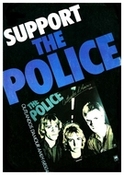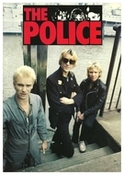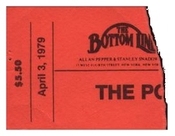
The Police at the Bottom Line...
On Tuesday, The Police cudgelled an open-minded Bottom Line crowd into happy submission. Their organic blend of reggae, reggae dub and power pop (complete with the yearning tenor lead that America loves) works well, although the songs don't perhaps walk out into the audience and tap their victims on the shoulder.
Two exceptions are 'Can't Stand Losing You' and (the hit) 'Roxanne'. The Police did a fully satisfying version of 'Roxanne', going between the verses. Sting (bassist and singer) got the crowd chanting, sand percussive syllables through an echoplex and generally did it to death. The choruses truly storned. Other good numbers were 'Feel So Lonely' (also with an Ire Feelings bit) and a bluesy vamp entitled 'There's A Hole In My Life' (which sometimes recalled the Earth, Wind & Fire version of 'Got To Get You Into My Life'). A trio, it was noted, is the only way to travel. Certianly the Police do great with the configuration.
The star of the show was Kim Turner, the band's sound engineer. Each instrument was eq'd, flanged, phased, digital-delayed, analog-delayed, unavoidably delayed, whatever. The Police sounded strong, which you expect from a three-piece, but also rich.
(c) Melody Maker by Davitt Sigerson
British Police trio...
The Police, who opened a two-night run at the Bottom Line on Tuesday, are the best British new-wave rock band to play in this city in a long time; certainly within the last five days. This is a trio consisting of Stewart Copeland, drums (an American who organised the band); Andy Summers, guitar, and Sting, bass and lead vocals (Sting's original name was Gordon Sumners).
Improbably given their new-wave antecedents, the Police had a recent hit single with a song called 'Roxanne'. But this is hardly an inherently popular band, insofar as that usually means a slavish willingness to conform to established expectations. What makes the Police interesting is their originality and the palpably crowd-pleasing success of that originality.
In a curious kind of way, what the band does recalls Pete Townshend of the Who at his most experimental, al though the results don't sound like that band. In other words, the Police take basic elements from the vocabulary of popular music and construct from them elaborate structures. Yet the original elements are always clear, such that the music remains capable of eliciting the emotional response of its roots.
In this case, the elements come from English new-wave rock, reggae and the sparer, more structural kinds of progressive rock. The Police's music retains a rhythmic sharpness and exactness, yet extends over long forms with lots of musical and verbal repetition and exotic colour from Mr. Summers's guitar and a liberal dose of echo. In addition, Sting's voice (even with a good deal of hoarseness at Tuesday's late show) is high and plaintive, and he and the two others are visually appealing. If the Police don't sound like the Who they don't sound like Talking Heads, either. But no other new rock band in recent memory has been able to combine intellectuality, progressivism and visceral excitement so well.
(c) The New York Times by John Rockwell
On Tuesday, The Police cudgelled an open-minded Bottom Line crowd into happy submission. Their organic blend of reggae, reggae dub and power pop (complete with the yearning tenor lead that America loves) works well, although the songs don't perhaps walk out into the audience and tap their victims on the shoulder.
Two exceptions are 'Can't Stand Losing You' and (the hit) 'Roxanne'. The Police did a fully satisfying version of 'Roxanne', going between the verses. Sting (bassist and singer) got the crowd chanting, sand percussive syllables through an echoplex and generally did it to death. The choruses truly storned. Other good numbers were 'Feel So Lonely' (also with an Ire Feelings bit) and a bluesy vamp entitled 'There's A Hole In My Life' (which sometimes recalled the Earth, Wind & Fire version of 'Got To Get You Into My Life'). A trio, it was noted, is the only way to travel. Certianly the Police do great with the configuration.
The star of the show was Kim Turner, the band's sound engineer. Each instrument was eq'd, flanged, phased, digital-delayed, analog-delayed, unavoidably delayed, whatever. The Police sounded strong, which you expect from a three-piece, but also rich.
(c) Melody Maker by Davitt Sigerson
British Police trio...
The Police, who opened a two-night run at the Bottom Line on Tuesday, are the best British new-wave rock band to play in this city in a long time; certainly within the last five days. This is a trio consisting of Stewart Copeland, drums (an American who organised the band); Andy Summers, guitar, and Sting, bass and lead vocals (Sting's original name was Gordon Sumners).
Improbably given their new-wave antecedents, the Police had a recent hit single with a song called 'Roxanne'. But this is hardly an inherently popular band, insofar as that usually means a slavish willingness to conform to established expectations. What makes the Police interesting is their originality and the palpably crowd-pleasing success of that originality.
In a curious kind of way, what the band does recalls Pete Townshend of the Who at his most experimental, al though the results don't sound like that band. In other words, the Police take basic elements from the vocabulary of popular music and construct from them elaborate structures. Yet the original elements are always clear, such that the music remains capable of eliciting the emotional response of its roots.
In this case, the elements come from English new-wave rock, reggae and the sparer, more structural kinds of progressive rock. The Police's music retains a rhythmic sharpness and exactness, yet extends over long forms with lots of musical and verbal repetition and exotic colour from Mr. Summers's guitar and a liberal dose of echo. In addition, Sting's voice (even with a good deal of hoarseness at Tuesday's late show) is high and plaintive, and he and the two others are visually appealing. If the Police don't sound like the Who they don't sound like Talking Heads, either. But no other new rock band in recent memory has been able to combine intellectuality, progressivism and visceral excitement so well.
(c) The New York Times by John Rockwell




